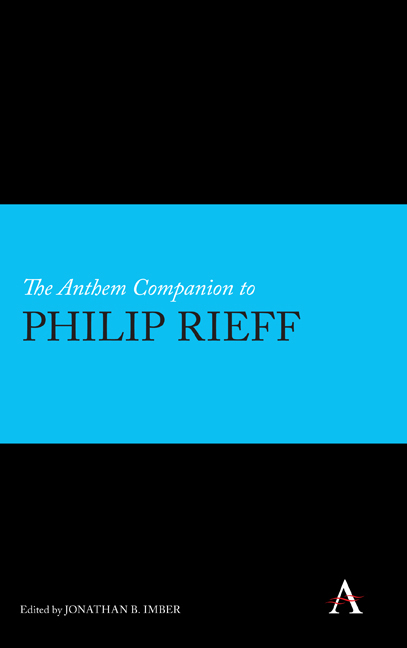Book contents
- Frontmatter
- Contents
- Introduction
- Chapter 1 Philip Rieff: Some Reflections
- Chapter 2 Philip Rieff and the Impossible Culture
- Chapter 3 Philip Rieff as Cultural Critic
- Chapter 4 Philip Rieff as Teacher
- Chapter 5 Prophet v. Stoic: Philip Rieff's Case against Freud
- Chapter 6 Decline and Fall in the Work of Philip Rieff: “I love the old questions” Beckett, Endgame
- Chapter 7 Philip Rieff as Social/ Cultural Theorist
- Chapter 8 Fellow Sons
- Chapter 9 Philip Rieff and Social Theory
- Chapter 10 A Kindly Apocalypse: Philip Rieff and the Endgame of the Therapeutic
- Chapter 11 Disenchantment, Authenticity and Ordinary Charisma
- Writings of Philip Rieff
- List of Contributors
- Index
Chapter 2 - Philip Rieff and the Impossible Culture
Published online by Cambridge University Press: 21 June 2018
- Frontmatter
- Contents
- Introduction
- Chapter 1 Philip Rieff: Some Reflections
- Chapter 2 Philip Rieff and the Impossible Culture
- Chapter 3 Philip Rieff as Cultural Critic
- Chapter 4 Philip Rieff as Teacher
- Chapter 5 Prophet v. Stoic: Philip Rieff's Case against Freud
- Chapter 6 Decline and Fall in the Work of Philip Rieff: “I love the old questions” Beckett, Endgame
- Chapter 7 Philip Rieff as Social/ Cultural Theorist
- Chapter 8 Fellow Sons
- Chapter 9 Philip Rieff and Social Theory
- Chapter 10 A Kindly Apocalypse: Philip Rieff and the Endgame of the Therapeutic
- Chapter 11 Disenchantment, Authenticity and Ordinary Charisma
- Writings of Philip Rieff
- List of Contributors
- Index
Summary
Philip Rieff may have recommended inactivity and sceptical distance as the correct course of action for the intellectual, but he did not shy away from judgement. While he guarded vigilantly the boundary between classroom and politics, there was no such strict distinction between fact and value in his own work. At the beginning of The Triumph of the Therapeutic, Rieff seemed to deploy the language of value- free neutrality in service of a quasi- Durkheimian cultural theory: Culture is a symbolic system that directs the self outward to communal purpose. Reading on though, we realize that his definition of culture— community organized around a god- term— is no longer what culture is; it is rather what culture was, and to Rieff's mind, what culture should be. “The new culture may be viable without being valid; and the old culture valid though no longer viable” (1966, 10). He also claimed in Fellow Teachers that he was neither for nor against his ideal- type of the new culture: the therapeutic. This is hardly credible, and anyone who read Rieff on Freud would have learned to read between the lines. What Rieff was saying between the lines— quietly in Freud: The Mind of the Moralist, quite obviously in Triumph and jarringly in later works— is that the therapeutic is the enemy of culture, and the new culture is in fact no culture at all. Rieff increasingly turned his mind to how to reinvigorate the “dead purposes” of that old culture.
Indeed, read as a whole, Rieff's version of social science is virtually all an iteration of value, picking up precisely at the point where Weber left off after allowing himself an uncharacteristic digression into “matters of faith and value” at the end of The Protestant Ethic. This border, Weber unconvincingly argued against himself, should mark the end of the social scientist's task. This after denouncing the “specialists without spirit and sensualists without heart” who make up the “last stage of cultural development” (2001, 124). It is however this paragraph as much as any other that has provided the moral drive and animus for the sociological tradition. Rieff's judgements may, with the passage of time, endure and resonate with the same sort of pathos as Weber's.
- Type
- Chapter
- Information
- The Anthem Companion to Philip Rieff , pp. 23 - 40Publisher: Anthem PressPrint publication year: 2018

